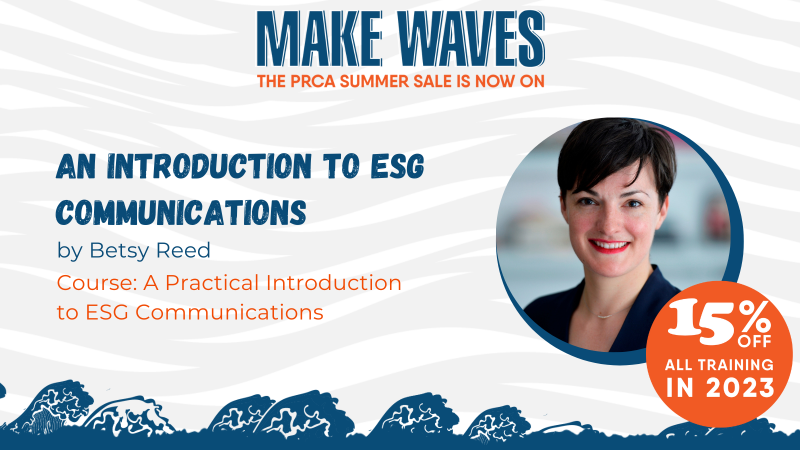
We live in a VUCA world - and if you don’t already know the term, it comes from the military and stands for Volatile, Unpredictable, Complex and Ambiguous. Given the past few years, you might even say we are living in a ‘VUCA-max’ world. And that makes the jobs of leaders, communicators and those who advise leaders much more interesting. An ability to grapple with complexity and communicate it clearly is key to the fundamental skillset of all of those roles, and the risk of getting things wrong is genuinely dangerous to a business or government.
As someone who’s spent 30 years swimming in the complexity of social and environmental issues, and, more recently, helping others to get to grips with them, I see this time in history as a collective moment of opportunity. We have an opportunity to upskill ourselves and each other, to gain an understanding of the complexities of social inequality, climate change and the range of related issues changing our world, to then bring a diverse range of perspectives and skillsets to solve them. The alternative is pretty stark - growing social unrest, accelerating climate change, volatile weather patterns and natural disasters, broken supply chain and eventual failure of particular business models.
A growing area of focus, because it is both required by regulators and part of delivering on public expectations that brands and businesses will deliver on ‘Environmental, Social, and Governance,’ or ESG. ESG is shorthand for the three main areas besides finance that can impact a company’s long-term performance. These include but are not limited to:
- climate change,
- diversity and inclusion,
- supply chain and labour practices,
- corporate governance and
- cybersecurity and data privacy.
ESG was initially an area of focus for investors, who need to make decisions based on long-term viability of investments, so need a complex overview of potential risks. Over the past few years, however, ESG has become increasingly embedded in general business strategy, as well becoming an area on which many businesses are required to report.
With the increasing range of reporting requirements and public expectations on related issues comes a need to communicate about them. Given the list of trends above, it’s fairly evident that communications around ESG need to be done expertly, based on a more-than-surface understanding of the complexities and risks involved. The days when communicators could simply execute a brief on complex issues related to social or environmental impact, thinking ‘Job done’ is long over. The very real risk of backlash and reputational damage from accusations of greenwash, purposewash or wokewash (and the potential for those accusations to actually be true) are far too great to wade into the world of ESG comms without training and tools.
I’ve seen it happen. You probably have too. That’s what motivated me to offer trainings on these issues in the past for the PRCA, and why I was asked to write the practical guide Communicating Social and Environmental Issues Effectively (which came out in summer 2020 as part of the PRCA’s Practice Guide series).
Communications professionals need to understand ESG issues in order to effectively manage reputation, engage with stakeholders, ensure compliance, and identify opportunities for innovation and differentiation. By understanding the importance of ESG and the complexities that spin outward from related issues, communications professionals can help their organisations build a more sustainable and responsible approach for the long term.
Whether you’re new to communicating these issues or have started to get a grasp on how to tackle them more skillfully, the practical classes I’ll be offering through the PRCA will help you refine your understanding and skills. Along with a general overview of ESG trends, risks and opportunities for communicators, participants will have an opportunity to discuss, share, and apply their learning during the class, using a framework I’ve developed through years of experience. It’s not rocket science, but it does require time and practice, and these classes will give you both.
Watch this space and sign up for a class or get in touch about bespoke ESG training for your organisation or team. related courses here!
About the author:
Betsy Reed is a leadership and sustainability advisor, trainer, author and speaker. She has spent the entirety of her career focused on social and environmental issues.
Over the course of the past 20 years, Betsy has worked on five continents and established an impactful career focused on communications, public affairs, campaigning and behaviour change with governments, NGOs, academic institutions and businesses. For the past nine years, she has worked as an independent advisor and mentor to leaders and leadership teams on issues ranging from ESG to diversity and inclusion, wellbeing to purpose-driven culture.
Past roles include leading Nestle UK’s sustainability public affairs programme, serving as Head of Campaigns for Zero Waste Scotland, working as Director of leading international communications agency Grayling's sustainability unit and serving as the first Director of Scotland's national fair trade body. Betsy was invited to write the book 'Communicating Social and Environmental Issues Effectively,' published in summer 2020 by the UK PR and Communications Association (PRCA) and Emerald Publishing. It has been called ‘the definitive guide to planning and delivering great communications on complex social and environmental issues.’
Originally from the US, Betsy is also British and is currently working on obtaining Spanish nationality, as a long-time resident of Spain. She is currently a Professor of Leadership at a university in Barcelona and is Head Tutor for the Cambridge University Institute for Sustainability Leadership (CISL) popular executive education course ‘Communicating for Influence and Impact.’
She also produces a podcast called ‘The Discomfort Practice,’ teaches mindfulness to leaders and integrates all of her areas of expertise to create and deliver trainings that are holistic, well-structured, interactive and practical.
